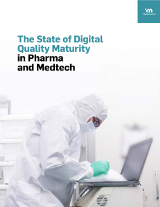
GxP Lifeline
Unlocking the Potential of AI in Quality Management: The Future of Quality Assurance

Artificial intelligence (AI) is rapidly transforming the world around us. From virtual assistants to self-driving cars, AI has permeated many aspects of our lives. One such area where AI is, can, and will be making a significant impact is in the quality field. By harnessing the power of AI in quality management, businesses can identify and address quality issues before they escalate, ensuring that products and services meet customer expectations.
In this blog post, we will delve into the ways AI is redefining quality assurance management, explore the advantages of embracing AI-powered quality assurance tools, and provide strategies for successfully integrating AI into existing workflows using real-world examples.
AI's Role in Transforming Traditional Quality Management Systems
AI is driving significant advancements in the way businesses approach quality assurance, reshaping traditional quality management systems. Here are three ways AI is shaping the future of quality management, illustrated with practical examples:
- Data-Driven Decision-Making:
- Automated Quality Control:
- Predictive Quality Management:
AI-powered quality assurance tools can analyze vast amounts of data in real-time, enabling businesses to make informed decisions based on trends, patterns, and insights. This leads to a more proactive approach to quality management, allowing for rapid identification and resolution of potential issues. For instance, a car manufacturing company can utilize AI-powered quality assurance tools to analyze real-time data from various sources, such as production lines, customer feedback, and historical records. By identifying trends, patterns, and insights, the company can make informed decisions and take a more proactive approach to quality management, rapidly identifying and addressing potential issues.
By employing AI algorithms, businesses can automate various quality control processes, reducing human error and increasing efficiency. This not only saves time and resources but also ensures a higher level of accuracy in detecting flaws and discrepancies in products and services. In the case of a pharmaceutical company, it can employ AI algorithms to automate the inspection of pills and capsules with 99.999% accuracy during the production process. By reducing human error and increasing efficiency, the company can ensure a higher level of accuracy in detecting flaws and discrepancies, ultimately leading to safer and more reliable medications.
AI in quality management can predict potential quality issues by analyzing historical data and identifying patterns that could lead to future problems. This allows businesses to address potential issues before they become critical, ensuring a consistent level of quality and enhancing customer satisfaction. As an example, a food processing plant can use AI in quality management to predict potential quality issues by analyzing historical data and identifying patterns that could lead to future problems. This foresight allows the plant to address potential issues before they escalate, ensuring a consistent level of quality and enhancing customer satisfaction.
Benefits of Implementing AI-Powered Quality Assurance Processes for Businesses
Incorporating AI into quality assurance management offers numerous benefits for businesses, including:
- Improved Efficiency: AI-powered quality assurance tools can streamline and automate various processes, reducing the time and effort required to maintain high quality standards. This frees up resources, allowing businesses to focus on other essential aspects such as innovation and growth.
- Enhanced Accuracy: AI algorithms can detect issues with pinpoint accuracy, eliminating the risk of human error. This ensures that products and services meet the highest quality standards and reduces the likelihood of costly recalls or negative customer feedback.
- Greater Customer Satisfaction: By ensuring a consistent level of quality across products and services, businesses can enhance the overall customer experience. This leads to increased customer loyalty, positive word-of-mouth, and a competitive edge in the market.
Strategies for Successfully Integrating AI Into Existing Quality Management Workflows
To harness the power of AI in quality management, businesses must adopt a strategic approach to integrate AI-powered quality assurance tools into their existing workflows. Here are four essential steps to follow:
- Assess Current Processes: Begin by taking stock of your current quality management processes and identifying areas where AI could provide the most significant benefits. This will help you determine which AI-powered quality assurance tools to invest in and prioritize their implementation.
- Invest in the Right AI Technologies: Carefully evaluate the various AI-powered quality assurance tools available in the market, considering factors such as scalability, ease of integration, and cost-effectiveness. Choose the tools that best align with your current and future business needs and objectives.
- Train Employees: Ensure that your team is well-versed in the use of AI-powered quality assurance tools by providing comprehensive training and ongoing support. This will help them effectively leverage the technology and contribute to the successful integration of AI into your quality management workflows.
- Monitor and Optimize: Continuously monitor the performance of AI-powered quality assurance tools and assess their impact on your quality management processes. Use the insights gained to optimize the AI algorithms further and enhance their effectiveness in improving your business's quality standards.
In conclusion, the future of quality lies in the effective integration of AI-powered quality assurance tools into existing quality management systems. By embracing AI in quality management, businesses can not only improve the quality of their products and services but also enhance the overall customer experience. The key to success lies in adopting a strategic approach to integrating AI, investing in the right technologies, and continuously monitoring and optimizing their performance. By doing so, businesses can stay ahead of the curve and maintain a competitive edge in an increasingly dynamic market.
Free Resource

Enjoying this blog? Learn More.
The State of Digital Quality Maturity in Pharma and Medtech
Download Now